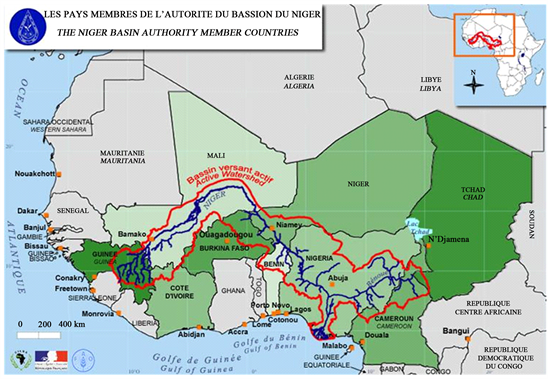5. 'The River of Rivers'.
As addressed in previous blogs, water in West African nations such as Nigeria and Côte d’Ivoire is facing severe challenges in the form of misallocation and pollution, with climate change heightening pressures further (Kundzewicz et al., 2007). These issues are compounded by the transboundary nature of water in the region, with my next two blogs investigating such shared water resources in West Africa and the cooperative strategies employed to alleviate tensions and negotiate more equitable utilisation of water (Tawfik, 2016).
It can be noted that 90% of all of Africa’s surface freshwater is in the form of river basins and lakes that are shared by two or more nations (Goulden et al, 2010), with transboundary aquifers (TBAs) representing an estimated 42% of the continental area (Altchenko and Villholth, 2013). I was astonished at the true extent of such transboundary water resources in West Africa specifically, with all countries in this region, except for Cape Verde, sharing at least one transboundary watercourse (Odili, 2018).
Shared watercourses in West Africa. Source.Moreover, it is equally as surprising that of all these shared water courses, only six have agreements targeted at regulation, with some nations such as Niger and Mauritania having an estimated 90% renewable resource dependency on water that is produced outside their borders (Odili, 2018).
Regulated vs. Non-Regulated Transboundary Watercourses in West Africa. Source.As a result of these revelations, there is clearly an increased need for transboundary cooperation strategies in order to avoid conflict, or what some term “water wars” (Gleick, 1993; Swain, 2001), with the Niger Basin Authority (NBA) aiming to bring improved water quality, increased energy and food security and wider benefits such as trade and access to markets (Sadoff and Grey, 2002).
A satellite image of the Niger River Delta. Source.The Niger Basin Authority (NBA, or Autorité du Bassin du Niger) founded in 1964 as the Niger River Commission was created to promote cooperative management of water resources in the basin of the Niger River, and is made up of nine countries with the shared aim of ensuring integrated development of the basin, focussing in particular on energy, agriculture, fishing, transportation and communications (Namara et al, 2011). The Niger Basin Authority member states. Source.
Despite earlier weaknesses, the NBA today successfully uses constant additions as well as an integrated legal framework, with the Niger Basin Water Charter, based on the “polluter pays” principle, legally binding contract under international law. The NBA is thus central in identifying the key risks facing the Niger Basin, such as drought (Ringler), whilst the fact that member states are required to inform the NBA’s Executive Secretary of any proposed developments, demonstrates the interlinked and cross-border nature of decision-making. Coupled with this, the establishment of a 20-year the Sustainable Development Action Plan for the Basin in 2007 (World Bank), combined with the acceptance of external assistance, with the Bank of African Development providing 37 million euros alongside partnerships with the World Bank, provides further legitimacy and support. The NBA is thus particularly useful as a knowledge brokerage organisation, however, the pursuit of independent agendas in the region (Medinilla, 2017) highlights the difficulties of transboundary water cooperation, with next weeks blog exploring these challenges in greater detail in Lake Chad.
The African Development Bank, the Government of Mali and the Niger River Basin Authority meet to discuss cooperative strategies. Source.






You have provided a very good synthesis here of literature and content. What is missing is how these all tie up to allow you to make your own argument. I would suggest enhancing what you have here by including a couple of sentences at the start of the start of the post to outline what you are focusing on and how you intend to do so.
ReplyDeleteWhile your synthesis is very thorough, it is quite a lot of text to get through for a blog post. Perhaps make more concise and write more conversationally. I would encourage you to write in the active voice.
(GEOG0036 PGTA)
Thank you Kerry, I have noted this and made some adjustments. I hope you enjoyed my other blogs too.
Delete